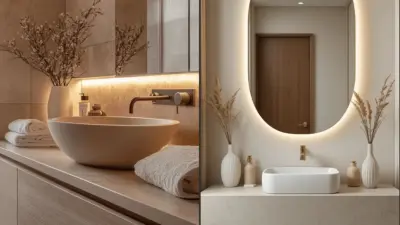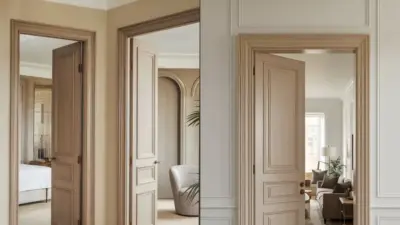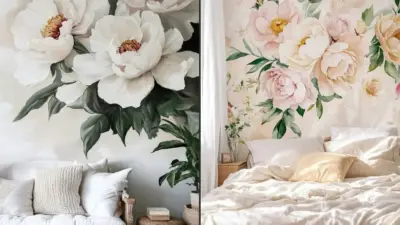If you want a kitchen that feels open, timeless, and easy to personalize, white is a smart choice. White kitchens instantly brighten the space, make it look more spacious, and work with almost any decorating style. Whether your taste leans modern, farmhouse, or traditional, you can find a white kitchen design to suit your needs.
You’ll discover how small upgrades, smart storage, and layered textures bring warmth and interest to an all-white space. There are plenty of ideas to help you create a kitchen that’s beautiful, practical, and easy to keep looking spotless.
Key Takeaways
- White kitchens offer a flexible foundation for any style.
- Design elements and storage can make white kitchens both attractive and functional.
- Small details and personalized touches prevent an all-white kitchen from feeling bland.


The Allure of White Kitchens
White kitchens remain popular due to their clean look, versatility, and lasting appeal. Choosing a white kitchen can enhance your home’s brightness and offer a flexible design backdrop.
Benefits of a White Kitchen
White kitchens reflect natural and artificial light, making your space appear brighter and more open. If you have a smaller kitchen or limited sunlight, white cabinetry and surfaces can help compensate by creating a sense of spaciousness.
Maintenance can be simpler since dirt and spills are more visible, allowing you to clean them up quickly and keep your kitchen looking tidy. White also contributes to a minimalist and organized feel, reducing visual clutter even if you use a mix of open shelving or glass-front cabinets.
By opting for white finishes, you introduce a sense of freshness that many equate with newness or cleanliness. The neutral palette makes it easy to update your decor later by swapping out accessories, hardware, or textiles.
Example Features:
- White quartz or marble countertops
- Glossy white subway tile backsplash
- White shaker-style cabinets
Timeless Appeal and Versatility
White kitchens have a longevity that helps avoid frequent design overhauls. They don’t typically fall out of favor, unlike some trendy color schemes, which makes them a safe choice if you want lasting style.
Versatility is another key advantage. A white backdrop works with nearly any design element, from stainless steel appliances to wood flooring. You can easily adapt the look by adding pops of color or swapping decorative accents.
Design styles that suit white kitchens include:
| Style | Features |
|---|---|
| Modern | Sleek cabinets, minimal hardware |
| Traditional | Detailed trim, classic fixtures |
| Scandinavian | Clean lines, natural accents |
You gain the flexibility to refresh the space without major renovations—simply update décor elements, lighting, or bar stools as trends or preferences change.
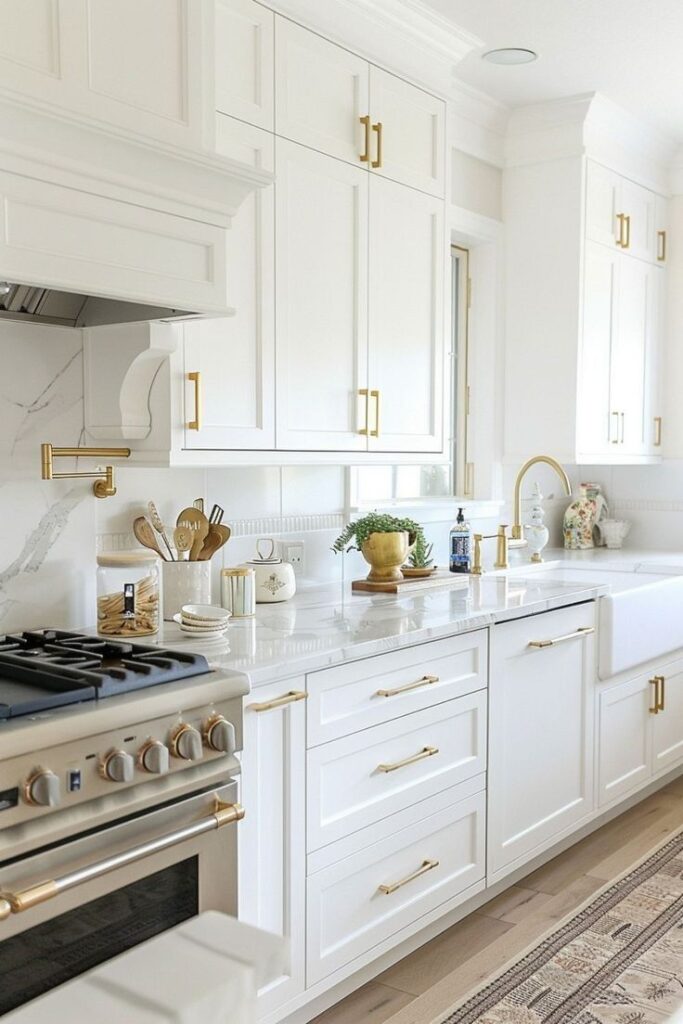
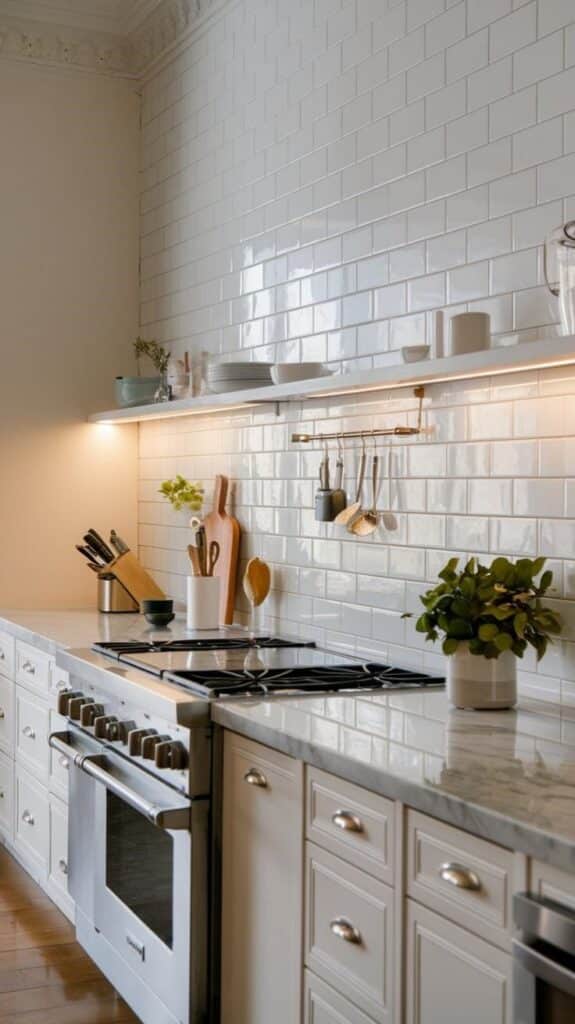
Key Elements of White Kitchen Design
White kitchens remain popular due to their timeless appeal and adaptability in various interior styles. Paying attention to key design details helps create a space that feels both welcoming and visually balanced.
White Shaker Cabinets
White shaker cabinets are a classic choice favored for their simple, clean-lined profile. They fit seamlessly into most kitchen design styles, from traditional to modern. The recessed panel doors provide subtle detail without heavy ornamentation.
Pros of White Shaker Cabinets:
- Versatile and blend easily with different countertops and hardware
- Reflect light to keep your kitchen bright and airy
- Offer a crisp, organized look that ages well
Pair white shaker cabinets with understated hardware in matte black or brushed nickel for a modern twist. Maintenance is straightforward since the flat surfaces make them easy to clean. By sticking with this style, you ensure your kitchen design stays current over time.
Countertop and Backsplash Combinations
Countertops and backsplashes in white kitchens play a significant role in breaking up the uniform color palette. Contrast is key. Many choose light marble, quartz, or granite with gentle veining to add subtle visual variety.
If you want a more dramatic look, consider dark or richly patterned stone for your countertops. A solid white backsplash—for example, classic subway tile—reinforces a clean, streamlined appearance.
Popular combinations include:
| Countertop | Backsplash | Effect |
|---|---|---|
| Carrara Marble | White Subway Tile | Elegant + Timeless |
| Black Granite | White Gloss Tile | High Contrast Modern |
| Quartz with Grey Vein | Herringbone Tile | Subtle Visual Interest |
To soften the look, you can also integrate natural materials like wood for shelving or trim.
White Kitchen Cabinet Styles
While shaker cabinets are a standout, there are other white kitchen cabinet styles worth considering. Flat-panel cabinets deliver a minimalist or contemporary feel. Beadboard doors can bring a touch of cottage charm.
Mixing upper and lower cabinet styles adds depth to your kitchen design. For example, try glass-front upper cabinets to showcase dishware or open shelving for a more relaxed appearance.
Consider the following white kitchen cabinet styles:
- Flat-Panel: Sleek and modern, pairs well with bold accents
- Beadboard: Textured, casual, adds warmth
- Glass-Front: Opens up the space, offers display potential
By mixing and matching cabinet styles, you create visual interest without compromising the cohesive look of a white kitchen.
Lighting for White Kitchens
Lighting is essential in a white kitchen since it affects how surfaces and colors appear. Use layered lighting that includes ceiling fixtures, under-cabinet lights, and accent lighting. This ensures even illumination, helps avoid shadows, and highlights the clean lines of your kitchen design.
Pendant lights over islands or dining areas can introduce other materials, such as metal or glass, to complement the cabinets. Consider warm-tone LED bulbs to soften the brightness of your white surfaces.
LED strip lighting beneath upper cabinets makes tasks easier and subtly emphasizes backsplashes and countertops. By choosing the right lighting design, you maintain the freshness of your kitchen while supporting the overall function and mood.


Creating Depth in a White Kitchen
Layering colors, textures, and materials is key to making a white kitchen interesting and inviting. Practical design choices like wood accents, greige tones, and varied finishes can help your space feel dynamic instead of one-dimensional.
Using Warm Wood Accents
Adding warm wood details instantly brings depth to a white kitchen. You can incorporate wood through floating shelves, cabinet handles, or a butcher block countertop. Oak, walnut, or maple all have distinct grains and shades, so choose a wood species that contrasts the white while complementing your style.
Consider wooden bar stools, trays, or light fixtures. Even small wooden accessories, like a cutting board or utensil holder, can soften a white scheme.
Mixing different types of wood can create a layered look, but stick to one main wood tone for cohesion. Placing wood near natural light, such as a wood-accented island under a window, highlights the grain and adds warmth to the space.
Table: Popular Wood Accents for White Kitchens
| Accent Type | Typical Wood Species |
|---|---|
| Floating Shelves | Oak, Walnut |
| Countertops | Maple, Butcher Block |
| Stools/Seating | Teak, Birch |
Incorporating Greige Tones
Greige, a blend of gray and beige, introduces a subtle contrast that pairs well with white. You can use greige on lower cabinets, a kitchen island, or as a wall color. This soft, neutral color bridges the gap between the crispness of white and the warmth of natural wood.
Greige backsplashes, tilework, or even barstools add a calm foundation without overpowering the kitchen’s brightness. Choose greige shades that have undertones that fit with your flooring and countertops.
If you want a seamless look, mix multiple shades of white and greige for cabinetry or trim. Using greige textile accessories like towels or curtains can also be a simple way to add depth.
Textural Elements and Materials
Varying textures is essential for a visually captivating white kitchen. Glass-front cabinets break up solid white doors, showcasing dishes and adding reflection. Textured backsplashes, such as subway tile or stone, introduce tactile interest and avoid a flat appearance.
Consider mixing metals—like brushed brass handles or matte black fixtures—for subtle contrast. Matte and glossy finishes on cabinets or tiles can make light play across surfaces differently.
Textured flooring, such as wood-look tile or herringbone-patterned brick, grounds the overall design. Incorporate woven baskets, linen runners, or ribbed ceramics for daily-use items to maintain both functionality and depth.


Maximizing Functionality in White Cabinetry
White cabinetry can enhance both the brightness and efficiency of your kitchen. Choosing functional features and keeping everything organized helps you make the most of this classic design.
Storage Solutions
White kitchen cabinets look clean and fresh, but their true value comes from maximizing internal storage. Pull-out shelves and deep drawers are excellent for storing pots, pans, and small appliances, making items easy to access without rummaging.
Consider integrating vertical dividers for baking sheets and cutting boards, or adding lazy Susans to corner cabinets. Use drawer organizers to separate utensils or spices, keeping everything in order.
Glass-front upper cabinets work well for displaying dishes while still providing storage. Tall pantry cabinets with adjustable shelves let you adapt the space as your needs change.
Table: Popular Storage Features for White Cabinetry
| Feature | Function |
|---|---|
| Pull-out Shelves | Easy access to deep storage |
| Lazy Susan | Maximize corner spaces |
| Drawer Organizers | Sort utensils/spices |
| Vertical Dividers | Store trays/pans upright |
| Tall Pantry Units | Flexible shelf options |
Organization Strategies
Keeping your white kitchen cabinets organized not only looks appealing but also saves you time. Label containers and group items by category, such as baking supplies or breakfast foods, to make it easier to find what you need.
Install hooks or hanging rails inside cabinet doors to store measuring cups or oven mitts. Stackable bins or clear containers help identify contents at a glance, reducing visual clutter.
Use dedicated zones for everyday items, like placing mugs and plates near the dishwasher. Store less-used items higher up to open up accessible space for daily essentials.
Rotate pantry stock regularly to keep goods fresh and avoid clutter. With smart organization, your white cabinetry stays both beautiful and practical.


Personalizing Your White Kitchen
A white kitchen offers a clean and timeless foundation, but it becomes much more inviting when you add personal touches through decor, accessories, and choice of finishes. Small design decisions have a big impact, letting your space reflect your taste and lifestyle.
Decor and Accessories
Choose items that introduce warmth and break up the uniformity of white. Wood cutting boards, open shelving with display dishes, and woven baskets add both utility and character. Greenery—such as potted herbs or fresh flowers—instantly softens the space.
Consider using textiles like patterned rugs or linen dish towels for subtle pops of color and texture. Artwork, from framed prints to minimalist wall sculptures, can reinforce your kitchen’s theme and create focal points.
Functional items, like stylish canisters or unique drawer pulls, provide opportunities to mix materials. Mixing glass, ceramic, and metal elements gives your kitchen a balanced, lived-in look while remaining easy to maintain.
Color Accents and Finishes
Introduce color through accent pieces rather than permanent fixtures. Painted bar stools, a colored backsplash, or a statement light fixture add interest without overwhelming the space. Look for muted blues, deep greens, or gentle pastels for a sophisticated palette.
Metal finishes have a noticeable effect on your kitchen’s personality. Brass, matte black, and brushed nickel hardware each create different moods, from warm and inviting to modern and sleek.
Wood accents—such as butcher block counters or floating shelves—bring a natural touch. If you prefer a cohesive look, choose finishes that repeat a few colors or materials throughout, tying all elements together.
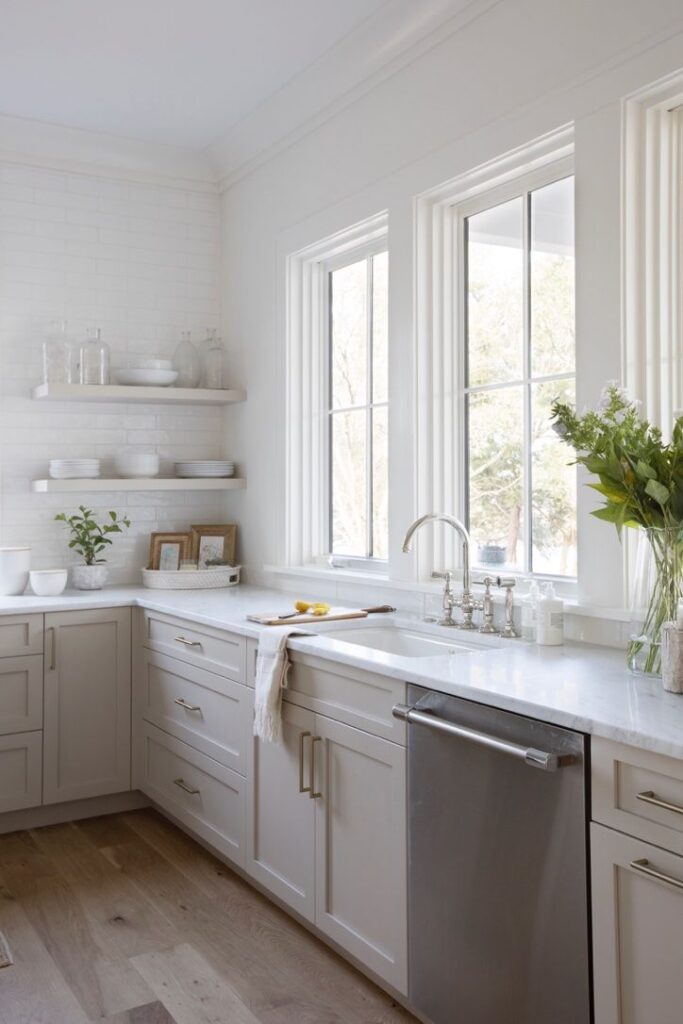

Maintenance and Cleaning Tips
Keeping your white kitchen bright relies on regular cleaning and the right care for surfaces. Attention to detail and immediate action help avoid stubborn stains or discoloration.
Preserving White Surfaces
Dust and debris can dull white finishes. Wipe down cabinets, counters, and backsplashes at least once a week using a soft microfiber cloth and a mild dish soap solution. For floors, vacuum or sweep before mopping with a gentle cleanser.
Pay close attention to corners and handles, where grime can collect. Install cabinet liners to protect shelves from spills and scuffs. When dealing with tough spots, use a mixture of vinegar and water, but avoid harsh abrasives or bleach, which can damage paint and finishes.
If you notice water spots or fingerprints, buff with a clean, dry cloth. Regular cleaning and gentle habits keep white surfaces looking new without needing deep cleans as often.
Preventing Stains and Yellowing
White materials are susceptible to staining from food, oils, and colored liquids. Wipe spills as soon as they occur, especially from coffee, wine, or tomato-based foods. Consider a small list to reference common stain culprits:
- Coffee and tea
- Tomato sauce
- Cooking oils and grease
Install a quality exhaust system to reduce grease and moisture settling on surfaces. To combat yellowing, avoid exposing cabinets and counters to direct sunlight for long periods. For persistent stains, use a paste made from baking soda and water, applying gently with a cloth.
Always test cleaning products in a hidden spot before using them on visible areas. Consistent care and immediate cleanup help keep white finishes crisp and vibrant.
Inspiring White Kitchen Ideas
White kitchens can create a sense of openness and brightness while allowing a wide range of design options. Whether your preference leans toward sleek, contemporary looks or classic, timeless aesthetics, there are several ways you can achieve a white kitchen that fits your style and functional needs.
Modern Minimalist White Kitchens
Embrace simplicity and functionality with clean lines and clutter-free spaces.
You can achieve a modern minimalist white kitchen by choosing flat-panel cabinets and integrated appliances. Handle-less cabinet doors and built-in organizers help maintain a seamless appearance. Opt for quartz or solid-surface countertops to add durability and keep surfaces unified.
A neutral color palette is central, but you can introduce contrast through matte black fixtures, stainless steel appliances, or subtle wood accents. Floating shelves and under-cabinet lighting keep the space bright and open, making the most of natural and artificial light.
Consider the following elements for a minimalist design:
- High-gloss or satin white cabinetry
- Minimal hardware and concealed storage
- Polished concrete or light-toned wood flooring
This approach prioritizes practicality and a calm ambiance, focusing on essential features and thoughtful material choices.
Traditional and Classic White Kitchens
Timeless charm and warmth blend with practical elements in a classic white kitchen.
Crown molding, shaker-style cabinetry, and subway tile backsplashes are staples of a traditional white kitchen. Pair these with marble or granite countertops for a refined yet welcoming look. Farmhouse sinks and brushed nickel hardware can enhance the sense of heritage.
Display cabinets with glass fronts and open shelving let you showcase everyday dishware or decorative items. Soft, warm lighting and traditional pendant lights over the island or dining area create a comfortable atmosphere.
A classic white kitchen provides both elegance and functionality, making it ideal if you value a space that feels inviting without sacrificing practicality. Soft grays or muted blues as accent colors can add depth without overwhelming the all-white theme.


Popular Trends in White Kitchens
Modern white kitchens are defined by thoughtful material choices and distinctive lighting features. These elements set the tone for both visual appeal and everyday functionality in your kitchen design.
Innovative Materials
Cabinetry in white kitchens now features a variety of finishes and materials. You will often see high-gloss lacquers, matte paints, or even subtle wood grains that provide depth without straying from a clean, airy aesthetic.
Quartz and solid surface countertops are favored for their low maintenance and consistent color. Porcelain and ceramic tile backsplashes add interest with texture or geometric shapes, making them a practical yet stylish choice.
Open shelving in light wood or metal supports an uncluttered look. Mixing metals—such as brushed nickel or matte black hardware—introduces a layer of contrast and modernity. Many homeowners choose wide-plank, pale oak flooring for softness and warmth.
Table: Common Materials in White Kitchen Design
| Element | Popular Materials |
|---|---|
| Cabinets | High-gloss lacquer, matte paint, wood grain |
| Countertops | Quartz, solid surface |
| Backsplashes | Porcelain tile, ceramic tile |
| Flooring | Pale oak, engineered wood |
Statement Lighting
Statement lighting plays a strategic role in defining your white kitchen. Oversized pendant lights or minimalist globe fixtures above islands create focal points that stand out against crisp surroundings.
Many designers use clustered glass pendants or linear LED fixtures for maximum effect. These choices bring both function and contemporary style, ensuring plenty of light while complementing the space’s simplicity.
You can add dimmable under-cabinet lighting for flexible task illumination and ambience. Brass, matte black, or chrome finishes coordinate with hardware, tying the space together. A bold light fixture can add personality to an otherwise neutral kitchen, emphasizing clean lines and architectural elements.


White Kitchen Ideas for Entertaining
An all-white kitchen offers a neutral canvas that’s both practical and visually inviting during gatherings. Its brightness helps set a lively mood while making food and décor choices stand out.
Creating a Welcoming Atmosphere
White kitchens reflect natural and artificial light, making even small spaces feel open and airy. If you want your guests to feel at ease, consider mixing white tones with warm accents—such as wooden stools, gold fixtures, or soft textiles—to prevent the space from feeling cold.
A white backsplash or marble countertop provides a clean backdrop for serving drinks and snacks. Open shelving in white allows you to display glassware or dishes, making them easily accessible for guests. Fresh greenery or a vase of flowers adds a welcoming touch on the kitchen island or dining table.
Lighting is crucial for entertaining. Pendant lights over a white island or under-cabinet LEDs give the room a vibrant feel. Guests often gather near the kitchen, so ample counter space and uncluttered surfaces help create an organized, inviting look.
Baking and Sharing Cookies
A white kitchen is ideal for baking and sharing cookies. The bright counters make it easier to see ingredients and spot spills, keeping your space tidy. White cabinetry and surfaces even highlight the colors and textures of finished cookies, which enhances presentation during gatherings.
For a seamless baking experience, keep utensils, mixing bowls, and bakeware stored within easy reach on open shelves or in organized drawers. Clean, white surfaces also make it simple to decorate cookies and showcase them on platters.
If you enjoy hosting cookie swaps or holiday baking parties, using white platters or cake stands creates a cohesive look on your buffet. Your guests can see the variety of cookies clearly, making selection easy. Light, neutral backdrops also make for appealing cookie photos if you like to share your creations.
- 161shares
- Facebook0
- Pinterest158
- Twitter3
- Reddit0

